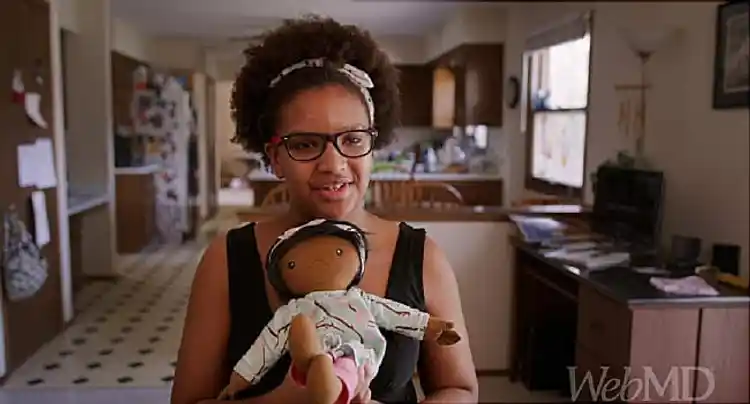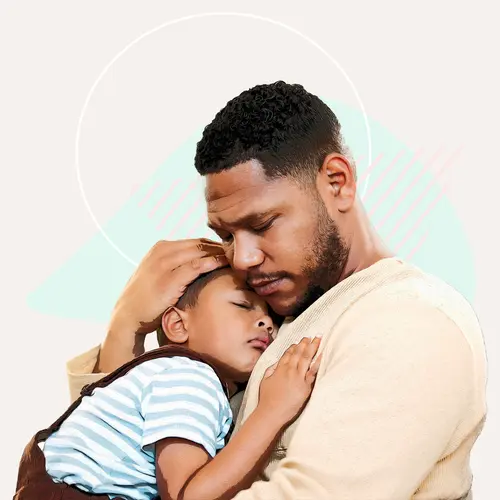A Doll Like Me

Hide Video Transcript
Video Transcript
[MUSIC PLAYING]
When you're doing social work in a hospital setting, ideally, you want the child to be comfortable with the medical things that they're about to go through, and so play therapy offers them an avenue to kind of play through some of their insecurities. You want to do medical play so that they know what's coming.
Typically, the doll orders come in from like a parent or a caregiver who will say, you know, my child has scars from surgery or a birthmark or cancer, and then they'll send pictures of their child. And then I literally just work off of the pictures. Each doll really starts as a piece of fabric. Because, like the kids, every doll is different, right? We don't all look the same. And it's a very surreal feeling to see that it went from my table or my kitchen counter to a child's arms.
[MUSIC PLAYING]
There are a number of people that could say, why isn't this a business? Why isn't this a factory? But I love the hands-on process. And I like to be able to read the emails. Because I think that a parent doesn't want a very cold person on the other end or even a computer-generated order forum.
I didn't realize, first of all, how many ways you could use a doll and how helpful they could become. We underestimate what that can do for a child who never will walk into the store and be able to see themselves. That's kind of the bigger picture of this, is, how are we going to decide as a society we want to represent these kids? And if I can be a part of that discussion, I'm thrilled.
[MUSIC PLAYING]
AMY JANDRISEVITS
I've made dolls a long time, just because I love dolls. And I think when it was socially inappropriate for me to play with them, making them was the next step. I was just making, actually, Raggedy Ann dolls just for fun, and I was doing really non-traditional ones. And a friend of a friend saw that I could make dolls. And her daughter had had her leg amputated. And so she wondered if I could do a doll with an amputated leg. And it went viral. It did. And so in two months, I had 200 orders. When you're doing social work in a hospital setting, ideally, you want the child to be comfortable with the medical things that they're about to go through, and so play therapy offers them an avenue to kind of play through some of their insecurities. You want to do medical play so that they know what's coming.
SPEAKER 1
Chase is seven. He has something called Angelman syndrome. The doll was really helpful when we went to go put his cast on. You know, he was a little anxious and scared, and so we brought the doll with us and used that to help explain what was going to be happening. AMY JANDRISEVITS
For a lot of the kids who have cancer, they're there for the long haul, and so it lets the child kind of prepare for what's happening. And when you're working with a child, you want the doll to look like the kid so that they can actually do that. Typically, the doll orders come in from like a parent or a caregiver who will say, you know, my child has scars from surgery or a birthmark or cancer, and then they'll send pictures of their child. And then I literally just work off of the pictures. Each doll really starts as a piece of fabric. Because, like the kids, every doll is different, right? We don't all look the same. And it's a very surreal feeling to see that it went from my table or my kitchen counter to a child's arms.
[MUSIC PLAYING]
There are a number of people that could say, why isn't this a business? Why isn't this a factory? But I love the hands-on process. And I like to be able to read the emails. Because I think that a parent doesn't want a very cold person on the other end or even a computer-generated order forum.
SPEAKER 1
It's been therapeutic for Chase. I think that dolls are very therapeutic in many ways, that they give you comfort, just make you feel more at ease. Just the fact that it looks like them I think is a really big deal for most kids. SPEAKER 2
It's really important because it's just another version of me. SPEAKER 3
Sometimes people think they look scary and stuff, but they really don't. They just look like how they look. It's like a mirror. You look at them, and you're like, this is how I look, and it's OK with how I look. AMY JANDRISEVITS
Parents are able to say, you know, my child loved being able to see a doll without a forearm or loved being able to see nevus marks. I think the ultimate empathy is to look at another person and say, that very easily could be me. And if you asked any of these parents what do they want people to get from their child, that's it. I didn't realize, first of all, how many ways you could use a doll and how helpful they could become. We underestimate what that can do for a child who never will walk into the store and be able to see themselves. That's kind of the bigger picture of this, is, how are we going to decide as a society we want to represent these kids? And if I can be a part of that discussion, I'm thrilled.
[MUSIC PLAYING]

